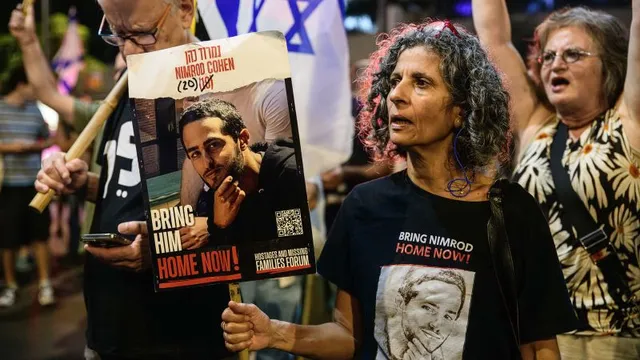
Hamas agrees to release Edan Alexander and bodies of hostages
2025-03-15 00:00- Hamas has agreed to release Edan Alexander, the last living American hostage in its captivity, along with the remains of four other hostages.
- The deal follows months of negotiations in Doha, Qatar, aimed at establishing a comprehensive ceasefire agreement.
- The Israeli government is cautious about the developments, perceiving Hamas's actions as manipulation, while families of hostages await their return.
Express your sentiment!
Insights
In recent developments in Gaza, Hamas announced its agreement to release Edan Alexander, the last living American hostage, alongside the remains of four dual-national hostages. This decision was made amidst ongoing indirect ceasefire negotiations facilitated by mediators in Doha, Qatar. As of March 14, 2025, Edan Alexander had been held for 525 days following his abduction during the October 7, 2023, attacks initiated by Hamas. The ongoing conflict, which has led to significant casualties and destruction on both sides, has cast a shadow over these negotiations, as humanitarian conditions in Gaza continue to deteriorate. The Prime Minister's office in Israel expressed skepticism regarding Hamas' intentions, suggesting that they are engaging in psychological manipulation rather than genuine negotiation. This announcement by Hamas came after a series of failed attempts to finalize the second phase of the ceasefire deal, which is crucial for addressing the release of remaining hostages still held by the group. The ceasefire's first phase had ended without clear outcomes, prompting tensions between the negotiating parties. In light of these circumstances, Israel's leadership plans to meet soon to evaluate the implications of this release and chart the next steps in their response strategy. The proposed exchange has been seen as a possible turning point, yet there remain major hurdles in the broader conflict resolution and future negotiations concerning hostages and a permanent ceasefire. As the situation develops, the international community is closely monitoring how these negotiations will unfold and whether they will lead to a stabilizing influence in the region. As the external pressures mount, including humanitarian disasters in Gaza and demands for a lasting peace, the actions taken by both Hamas and Israel will be critical in shaping the future landscape of the Israel-Palestine conflict. Returning hostages is an immediate concern for families and governments alike, and how negotiations are approached will have lasting effects on the involved populations and peace efforts moving forward.
Contexts
The ceasefire negotiations between Hamas and Israel have long been a focal point in the quest for peace in the Middle East. Recent developments have highlighted the ongoing complexities involving various stakeholders, including regional powers and international mediators. As of March 2025, efforts to broker a lasting ceasefire are taking center stage, with discussions centered on addressing humanitarian concerns, security guarantees, and the broader political landscape. This negotiation process is often affected by the fluctuating levels of violence, public sentiment, and external influences from countries both within and outside the region. One of the critical components of the ceasefire negotiations is the humanitarian situation in Gaza, which remains dire. The international community, including the United Nations and various non-governmental organizations, has called for urgent action to alleviate the suffering of the civilian population. During negotiations, Hamas has sought assurances regarding the lifting of blockades and increased access to essential goods and services. Israel, on the other hand, has emphasized the need for guarantees against future rocket attacks and the disarmament of militant factions. These critical points of contention are often at the forefront of discussions and reflect the underlying mistrust between the parties. Moreover, the role of mediators in the ceasefire negotiations cannot be understated. Egypt has historically played a central role in mediating talks between Hamas and Israel, leveraging its geographical proximity and historical ties. Other regional players, such as Qatar and Turkey, have also sought to provide support for these negotiations. The involvement of international powers, including the United States, adds another layer of complexity, with varying interests influencing the dynamic. As negotiations progress, the challenge lies in balancing these diverse interests while striving for a sustainable agreement. In summary, the ceasefire negotiations between Hamas and Israel are characterized by multifaceted challenges that intertwine humanitarian, political, and security dimensions. Achieving a viable and lasting ceasefire requires addressing immediate humanitarian concerns while also tackling the underlying issues driving conflict. The commitment from all parties involved, coupled with effective mediation and international support, will be crucial in steering the conversation towards a path that ensures long-term stability and peace in the region.